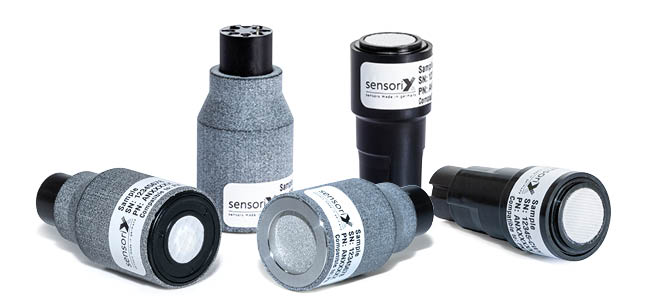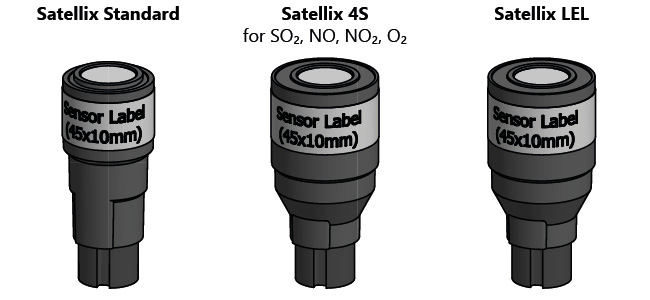Satellix sensors by Sensorix
Order new replacement sensors for Honeywell's Satellite XT* system - exclusively at GfG. The specialized Satellix sensors by Sensorix are a completely compatible, reliable and durable component for your gas detection system. Choose from a variety of electrochemical sensors for toxic gases, oxygen and hydrogen or a catalytic sensor for monitoring the lower explosion limit (% LEL).
What makes Satellix sensors special?

highly customized mechanical sensor adaptation

100% compatible with the Satellite XT* transmitter

electrochemical and catalytic combustion sensors for monitoring LEL

detects more than 30 gases commonly used in semiconductor processes
Which type of gas detection devices are compatible with Satellix sensors by Sensorix?
The Sensorix Satellix series is a special mechanical adaptation of gas sensors for measuring toxic, corrosive and combustible gases.
They are ready to use with any Satellite XT* transmitter immediately. Each of these sensors offers excellent stablity, reliability and high selectivity,


Key information about the Satellix format
1. Satellix sensors are available in three different sizes, depending on the types of gases they need to measure. The electrochemical Satellix Standard sensors will detect most common gases, while the Satellix 4S, another type of EC sensors, measures SO2, NO, NO2 and O2. The Satellix LEL catalytic combustion sensors are specialized in detection of combustible gases and vapors.
2. All Satellix sensors come with their own socket and programmed EPROM. Owners of Satellite XT* devices thus have a plug and play sensor solution.
3. The Satellix series by Sensorix offers a broad range of sensors for detecting a variety of hydride gases, such as AsH3, PH3, SiH4, B2H6, and SeH2, as well as gases that are commonly used in semiconductor processing, such as HF, HCl, HBr, Cl2, NH3, or H2.
List of measurable gases and available sensors
Find the right sensor for your gas here.
| Sensor | Measuring range | Replaces Satellite XT | GfG Part no. | Details |
|---|---|---|---|---|
| H2 | 0 - 1 vol % | 9602-5001 | 3699001 | » more |
| H2 | 0 - 4 vol % | 9602-5101 | 3699002 | » more |
| H2S | 0 - 100 ppm | 9602-5200 | 3699003 | » more |
| Cl2 | 0 - 5 ppm | 9602-5300 | 3699004 | » more |
| Cl2 (lower detection limit) | 0 - 5 ppm | 9602-5301 | 3699005 | » more |
| CO | 0 - 500 ppm | 9602-5400 | 3699006 | » more |
| CO (lower detection limit) | 5 - 50 ppm | 9602-5401 | 3699007 | » more |
| O2 | 0 - 25 vol % | 9602-5501 | 3699008 | » more |
| H2Se (gel) | 0 - 5 ppm | 9602-5600 | 3699009 | » more |
| H2Se (LT) | 0 - 5 ppm | 9602-5601 | 3699010 | » more |
| HCN | 0 - 30 ppm | 9602-5700 | 3699011 | » more |
| HCl | 0 - 30 ppm | 9602-5800 | 3699012 | » more |
| SO2 | 0 - 25 ppm | 9602-5900 | 3699013 | » more |
| SO2 (lower detection limit) | 0 - 5 ppm | 9602-5901 | 3699014 | » more |
| AsH3 (2E CS zero H2) – no EPROM | 0 - 1 ppm | 9602-6000 | 3699015 | » more |
| AsH3 (2E zero H2) | 0 - 1 ppm | 9602-6000 | 3699016 | » more |
| AsH3 (zero H2) | 0 - 1 ppm | 9602-6000 | 3699017 | » more |
| AsH3 (gel) | 0 - 1 ppm | 9602-6001 | 3699018 | » more |
| AsH3 (zero H2 scrubber) | 0 - 10 ppm | 9602-6002 | 3699019 | » more |
| AsH3 (zero H2 lower detection limit) | 0 - 1 ppm | 9602-6003 | 3699020 | » more |
| AsH3 (LT) | 0 - 1 ppm | 9602-6004 | 3699021 | » more |
| AsH3 (LT lower detection limit) | 0 - 1 ppm | 9602-6005 | 3699022 | » more |
| PH3 (2E zero H2) | 0 - 1 ppm | 9602-6100 | 3699023 | » more |
| PH3 (zero H2) | 0 - 1 ppm | 9602-6100 | 3699024 | » more |
| PH3 (gel) | 0 - 1 ppm | 9602-6101 | 3699025 | » more |
| PH3 (LT) | 0 - 1 ppm | 9602-6102 | 3699026 | » more |
| B2H6 (gel) | 0 - 1 ppm | 9602-6200 | 3699027 | » more |
| B2H6 (gel lower detection limit) | 0 - 1 ppm | 9602-6201 | 3699028 | » more |
| B2H6 (LT) | 0 - 1 ppm | 9602-6202 | 3699029 | » more |
| B2H6 (LT lower detection limit) | 0 - 1 ppm | 9602-6203 | 3699030 | » more |
| SiH4 (gel) | 0 - 50 ppm | 9602-6300 | 3699031 | » more |
| SiH4 (LT) | 0 - 50 ppm | 9602-6301 | 3699032 | » more |
| F2 | 0 - 5 ppm | 9602-6400 | 3699033 | » more |
| F2 | 0 - 30 ppm | 9602-6401 | 3699034 | » more |
| F2 (lower detection limit) | 0 - 1 ppm | 9602-6402 | 3699035 | » more |
| HF | 0 - 10 ppm | 9602-6500 | 3699036 | » more |
| COCl2 | 0 - 1 ppm | 9602-6600 | 3699037 | » more |
| NH3 | 0 - 100 ppm | 9602-6704 | 3699038 | » more |
| NH3 | 0 - 1000 ppm | 9602-6705 | 3699039 | » more |
| HMDS | 0 - 500 ppm | 9602-6714 | 3699040 | » more |
| HMDS | 0 - 0.5 vol % | 9602-6715 | 3699041 | » more |
| Br2 | 0 - 5 ppm | 9602-6800 | 3699042 | » more |
| GeH4 (gel) | 0 - 5 ppm | 9602-6900 | 3699043 | » more |
| GeH4 (gel lower detection limit) | 0 - 1 ppm | 9602-6901 | 3699044 | » more |
| GeH4 (LT) | 0 - 5 ppm | 9602-6902 | 3699045 | » more |
| GeH4 (LT lower detection limit) | 0 - 1 ppm | 9602-6903 | 3699046 | » more |
| HBr | 0 - 30 ppm | 9602-7000 | 3699047 | » more |
| O3 | 0 - 1 ppm | 9602-7100 | 3699049 | » more |
| O3 (exhaust gas) | 0 - 1 ppm | 9602-7101 | 3699050 | » more |
| NO | 0 - 250 ppm | 9602-7200 | 3699051 | » more |
| NO2 | 0 - 25 ppm | 9602-7300 | 3699052 | » more |
| ClO2 | 0 - 1 ppm | 9602-7400 | 3699053 | » more |
| ClF3 | 0 - 1 ppm | 9602-7410 | 3699054 | » more |
| TEOS | 0 - 100 ppm | 9602-7500 | 3699055 | » more |
| TMB | 0 - 500 ppm | 9602-7510 | 3699056 | » more |
| DCE (for pyrolyzer only) | 0 - 1000 ppm | 9602-9600 | 3699060 | » more |
| NF3 (for pyrolyzer only) | 0 - 50 ppm | 9602-9700 | 3699061 | » more |
| SF6 (for pyrolyzer only) | 0 - 0.5 vol % | 9602-9710 | 3699062 | » more |
| CH3F (for pyrolyzer only) | 0 - 0.05 vol % | 9602-9720 | 3699063 | » more |
| C5F8 (for low flow pyrolyzer only) | 0 - 20 ppm | 9602-9730 | 3699064 | » more |
| C4F6 (for pyrolyzer only) | 0 - 50 ppm | 9602-9732 | 3699065 | » more |
| O2 (lead-free) | 0 - 25 vol % | 9602-5555 | 3699066 | » more |
| LEL | 0 - 100 % LEL | 9602-9900 | 3699101 | » more |
| LEL (Sat-Ex) | 0 - 100 % LEL | 9602-9902 | 3699102 | » more |
| LEL (lower detection limit) | 0 - 100 % LEL | 9602-9904 | 3699103 | » more |
* Trademark of Honeywell International Inc
